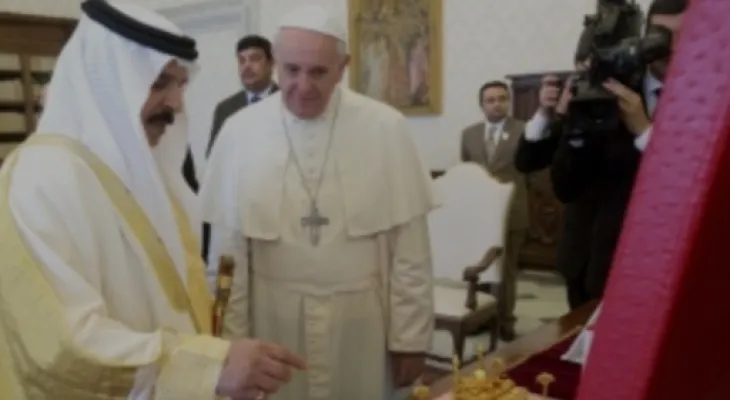Search here
Newspaper
Search here

Arab Canada News
News

Published: November 3, 2022
Pope Francis urged Bahraini authorities on Thursday to abandon the death penalty and guarantee basic human rights for all citizens upon his arrival in the Sunni-led kingdom, which is accused by rights groups of systemic discrimination against the Shia majority. With King Hamad bin Isa Al Khalifa by his side, Francis also urged the Gulf state to ensure "safe and dignified" working conditions for its migrant workers, who have long faced abuse and exploitation in the island's construction, oil extraction, and domestic service industries. While diplomatic, Francis did not shy away from some of the controversial social issues in Bahrain at the start of his four-day visit to participate in a government-sponsored interfaith conference on dialogue between East and West and to serve the small Catholic community in the country.
The 85-year-old Francis, who has been using a wheelchair for several months due to knee ligament strain, said he "was in severe pain" while traveling to the Gulf. For the first time, he welcomed journalists traveling with him while seated instead of walking down the plane aisle. Also, human rights groups and relatives of Shia activists sentenced to death urged Francis to use his visit to Bahrain to call for an end to the death penalty and advocate for political opponents, hundreds of whom have been arrested since Bahrain violently crushed Arab Spring protests in 2011, with the help of Saudi Arabia and the United Arab Emirates.
In the years that followed, Bahrain imprisoned Shia activists, deported others, stripped hundreds of citizenship, banned the largest Shia opposition group, and shut down its leading independent newspaper. At the same time, the Bahraini government insists it respects human rights and freedom of expression. Before the trip, the government told The Associated Press that it has a "zero tolerance policy toward discrimination, persecution, or promoting division based on race, culture, or belief." Francis indirectly referenced sectarian strife upon his arrival at the desert town of Awali and met with the Khalifa at the royal Al-Sakhir Palace during the first ever papal visit to Bahrain. Speaking to government officials and diplomats from the glittering palace square, Francis praised Bahrain’s tradition of tolerance and cited Bahrain's constitution, which prohibits discrimination based on religion, as a declared commitment that must be implemented. He said doing so would ensure "the concrete recognition of equal dignity and equal opportunities for each group and for each individual."
In reference to the death penalty, Francis said the government must first and foremost guarantee the right to life, and "the need to always guarantee this right, including those who are punished, whose lives should not be taken." According to the Bahrain Institute for Rights and Democracy, Bahrain effectively ended its death penalty moratorium in 2017 and has executed six prisoners since. Additionally, the organization and Human Rights Watch have documented a "significant increase" in the number of death sentences handed down since 2011, with 26 people awaiting execution, half of them due to their political activities. The groups said some were convicted after "clearly unfair trials based solely or primarily on confessions allegedly extracted under duress through torture and ill-treatment."
In the period leading up to the visit, a Bahrain rights group issued a letter from relatives of some prisoners sentenced to death, pleading with Francis to raise the issue and visit Jau Prison where many political detainees are held. The letter stated: "Our family members remain behind bars and are at risk of execution despite the clear injustice of their convictions."
In the same context, Francis noted that Bahrain has one of the highest levels of migration worldwide, with about half the population being foreign workers, but much of the work was "inhumane," adding: "Let us ensure that working conditions everywhere are safe and dignified." He urged Bahrain to be "a beacon across the region to promote equality of rights and improve the conditions of workers, women, and youth, while ensuring respect and care for all those who feel marginalized in society, such as migrants and prisoners."
Comments